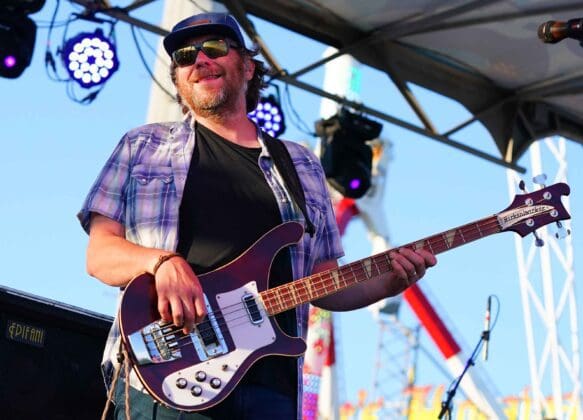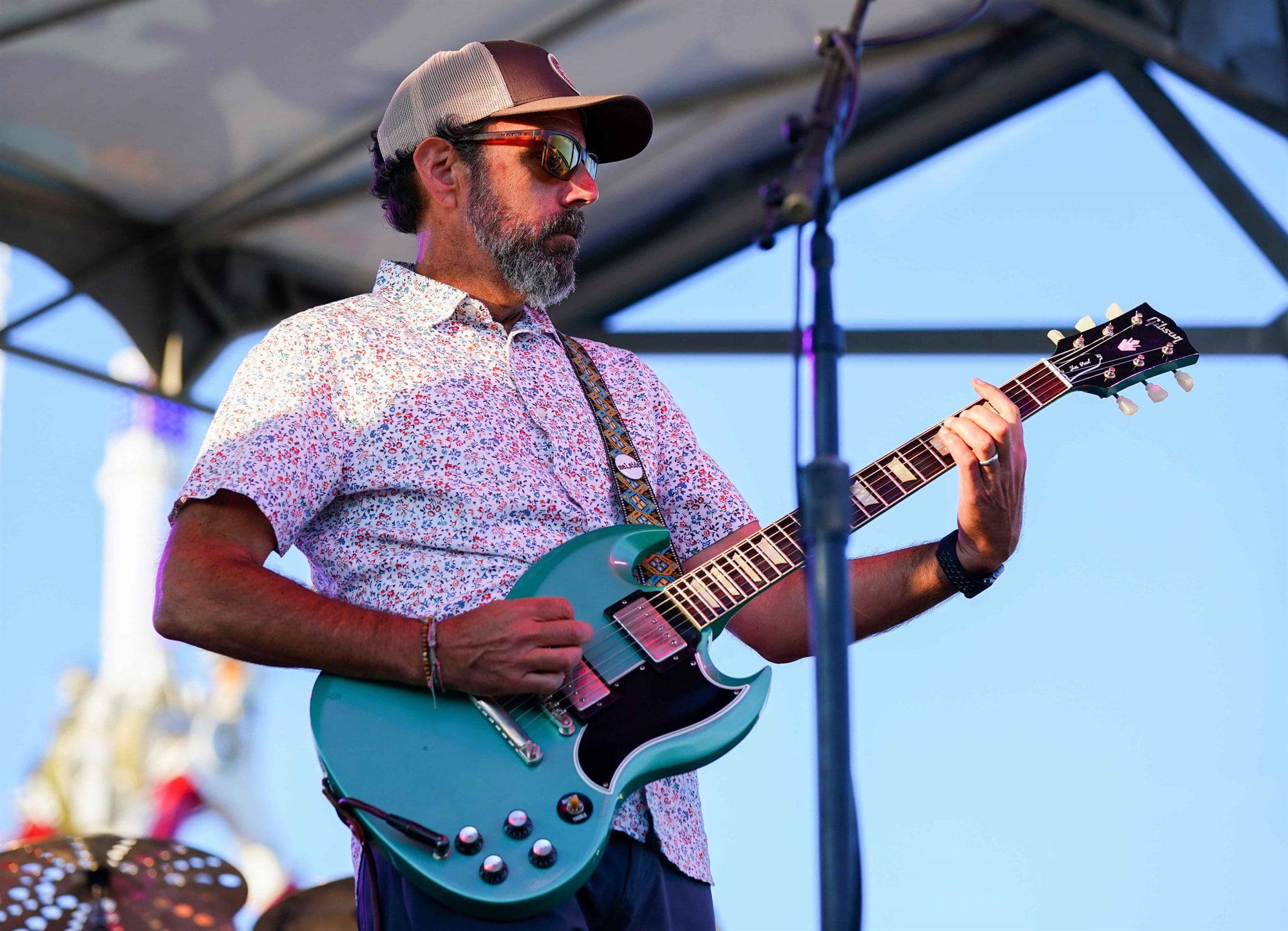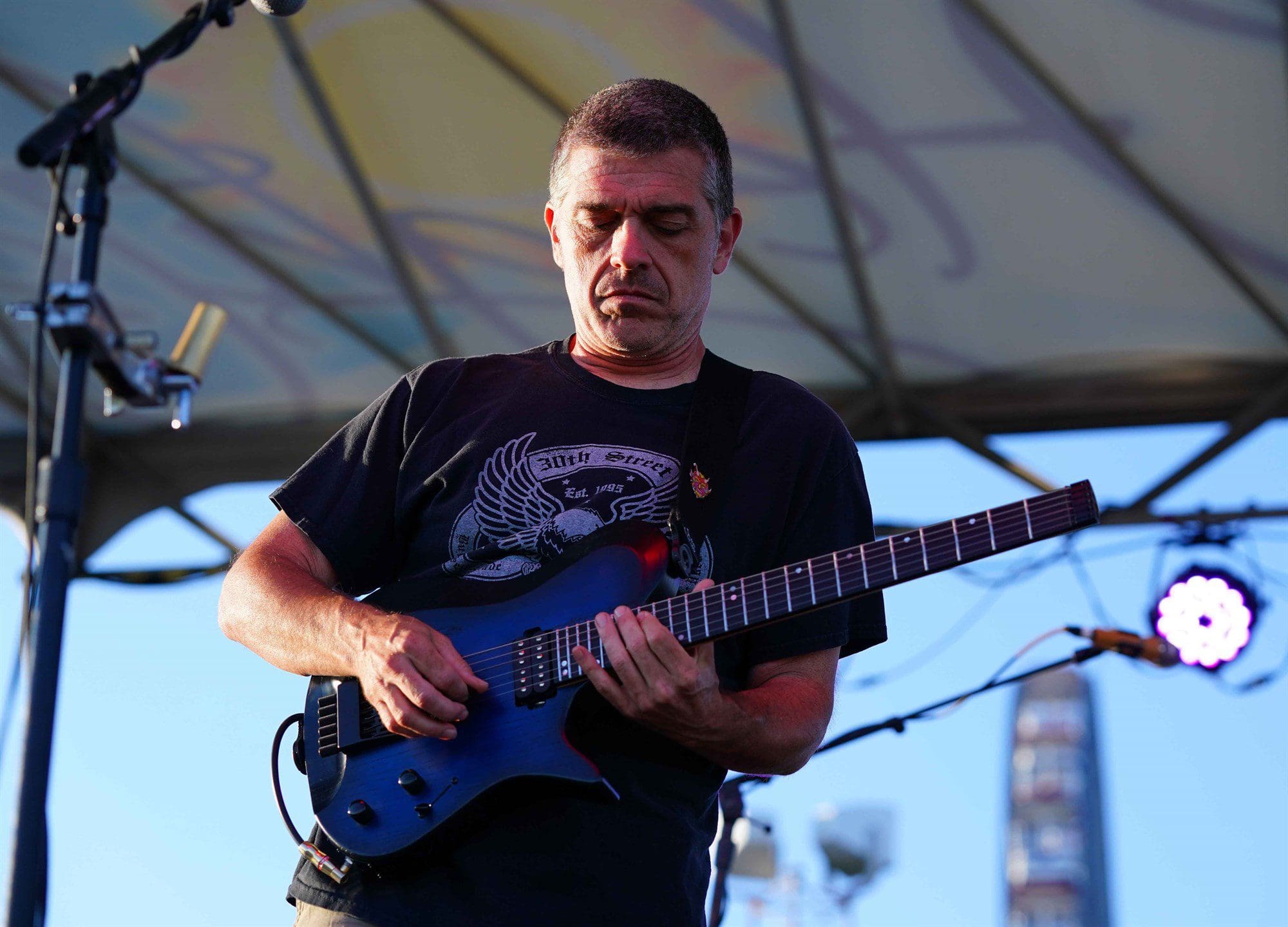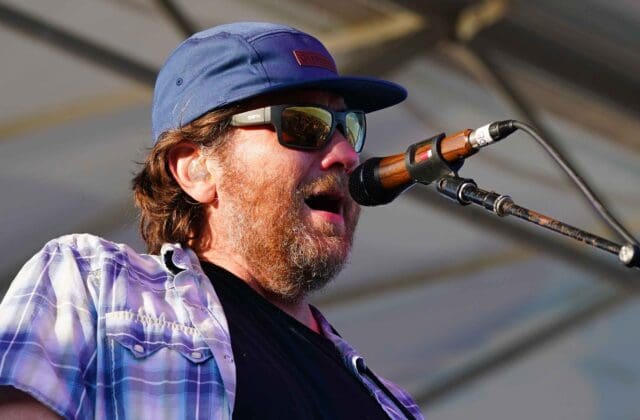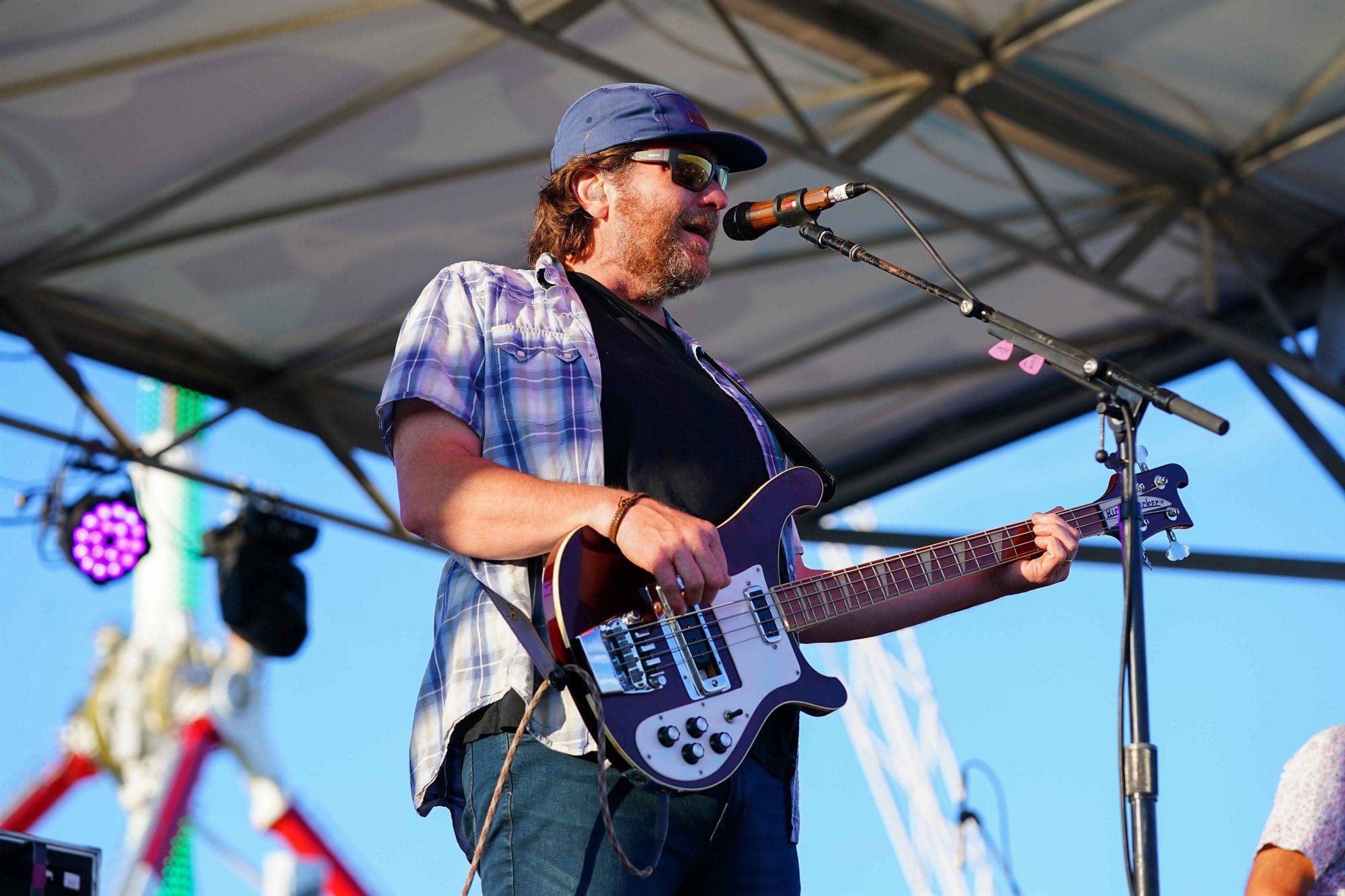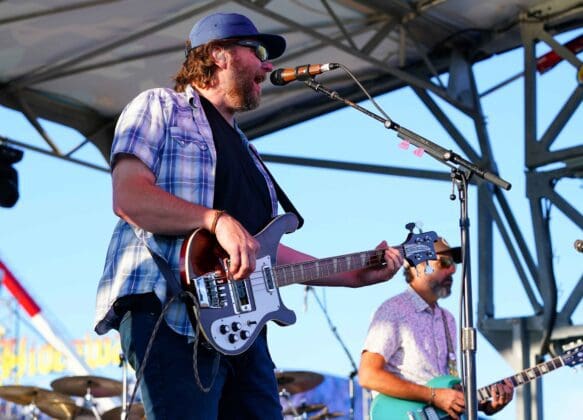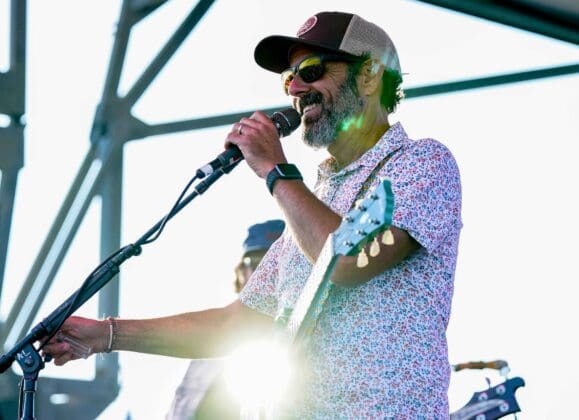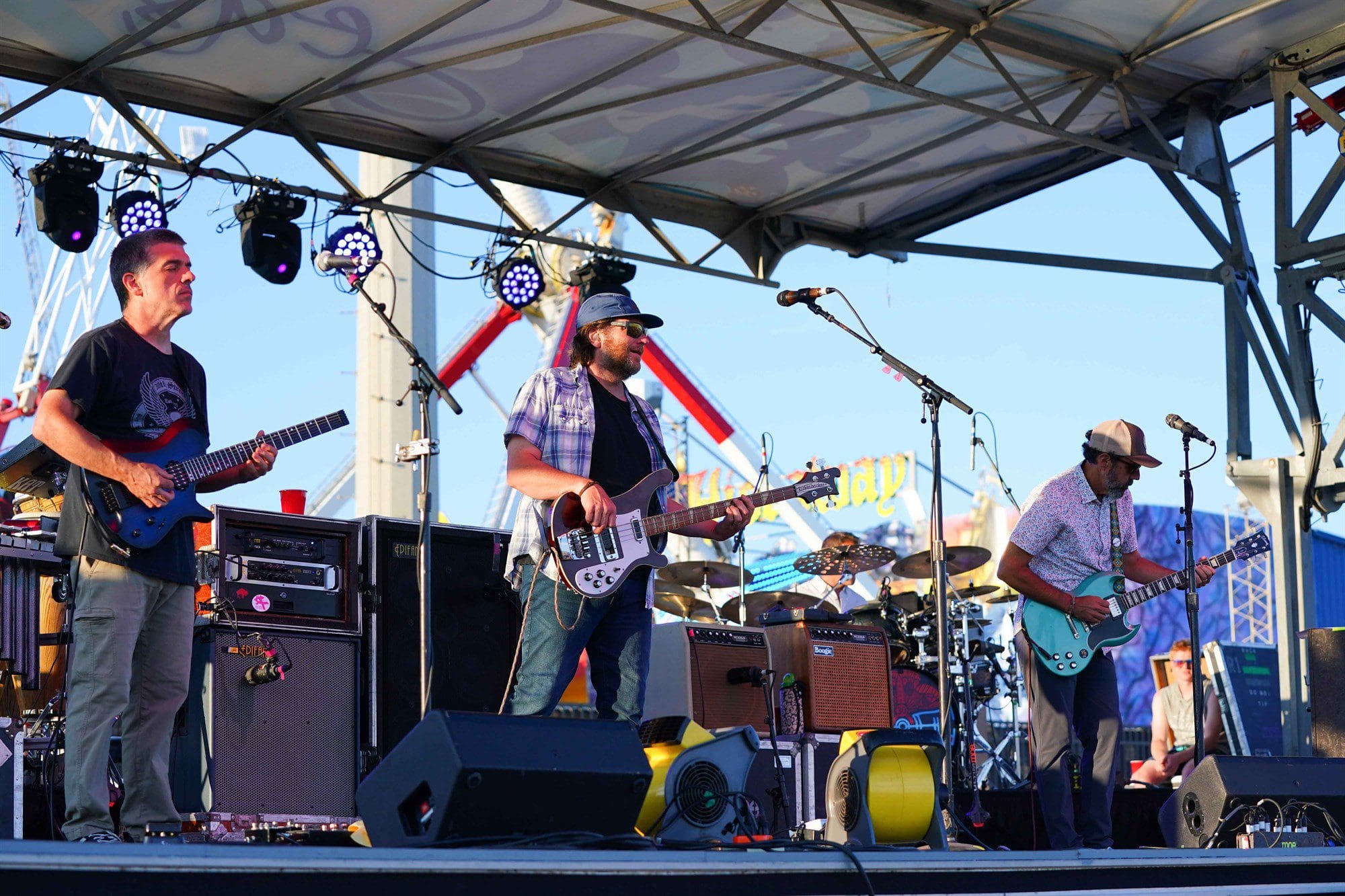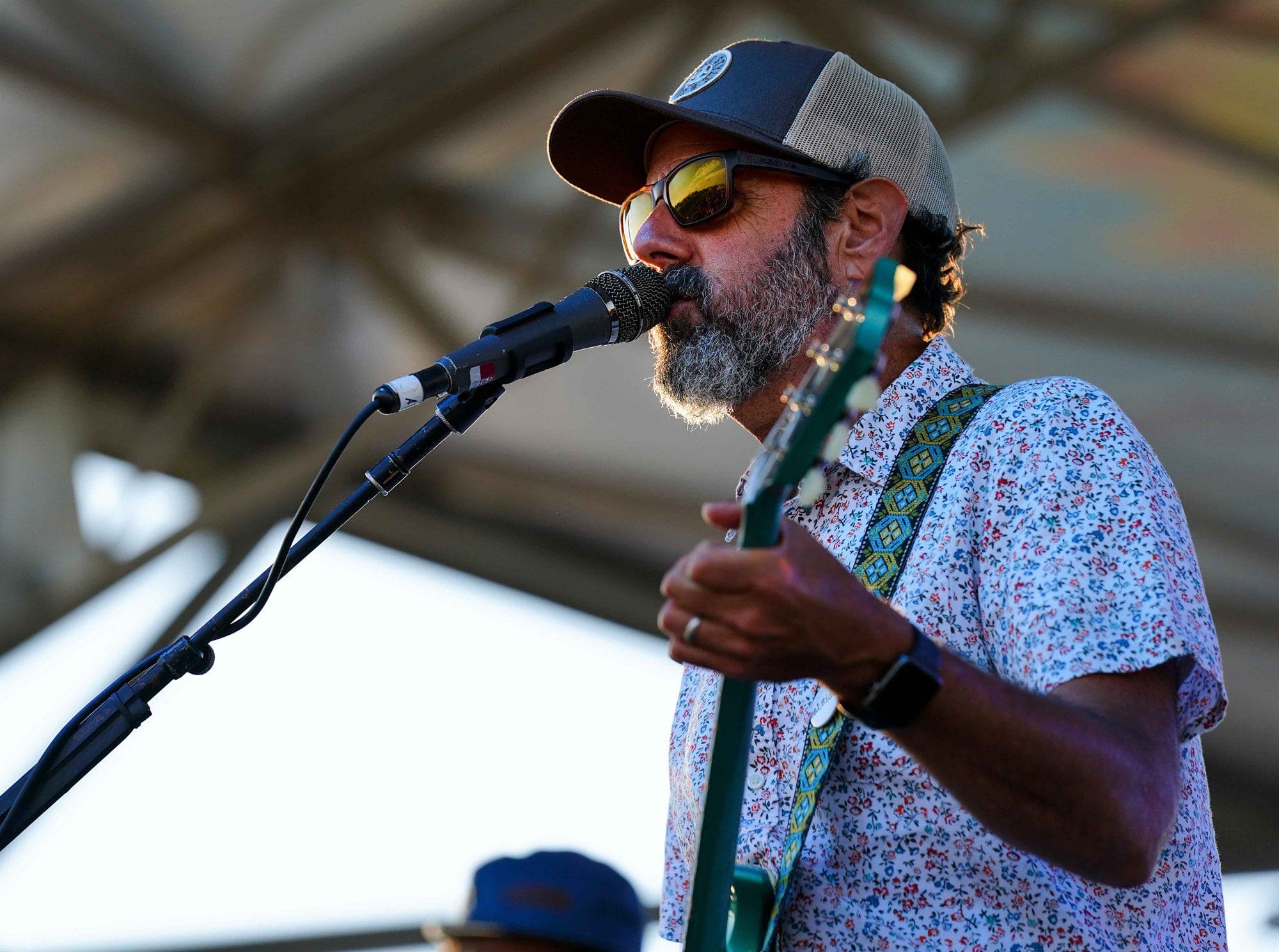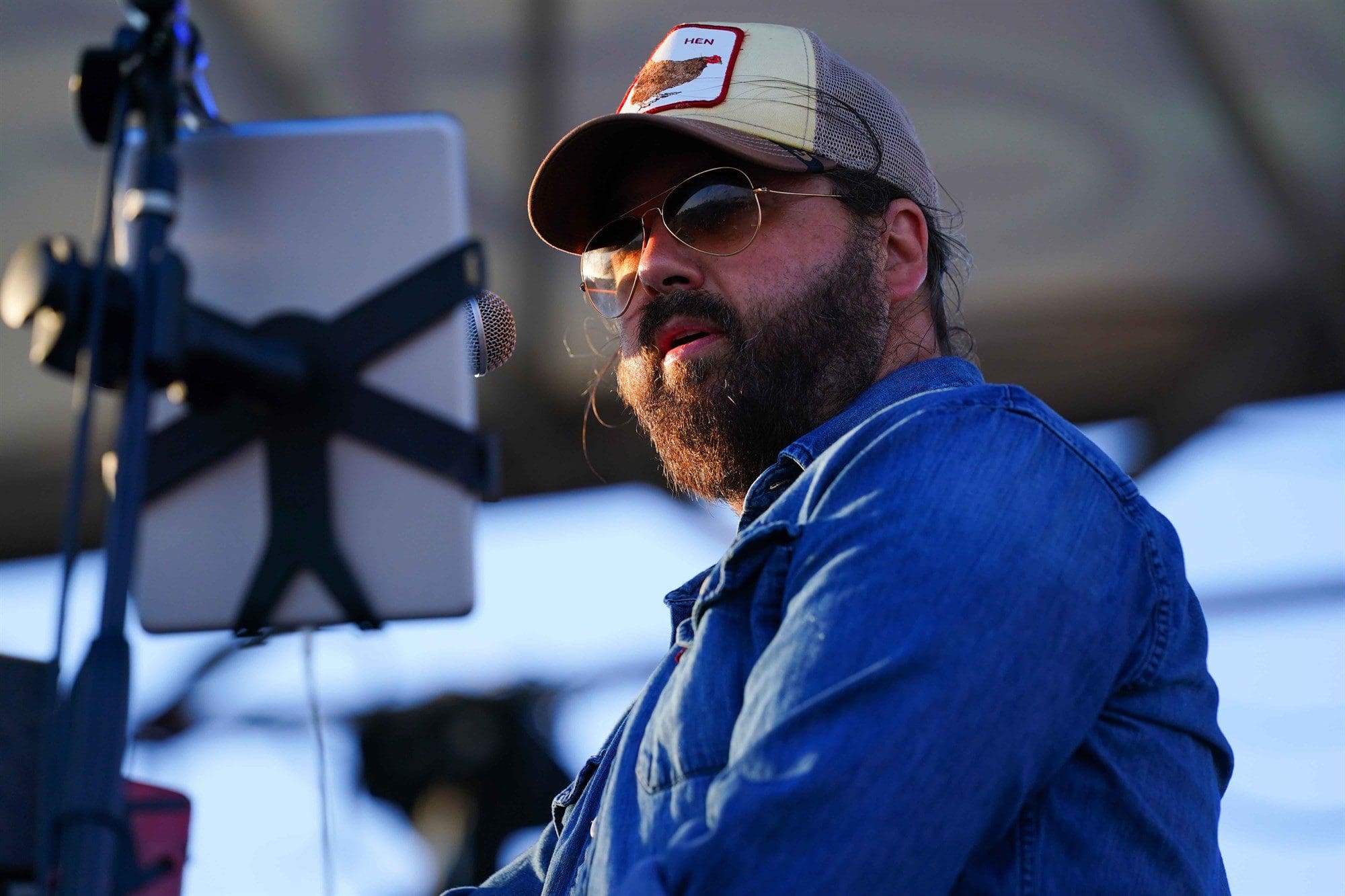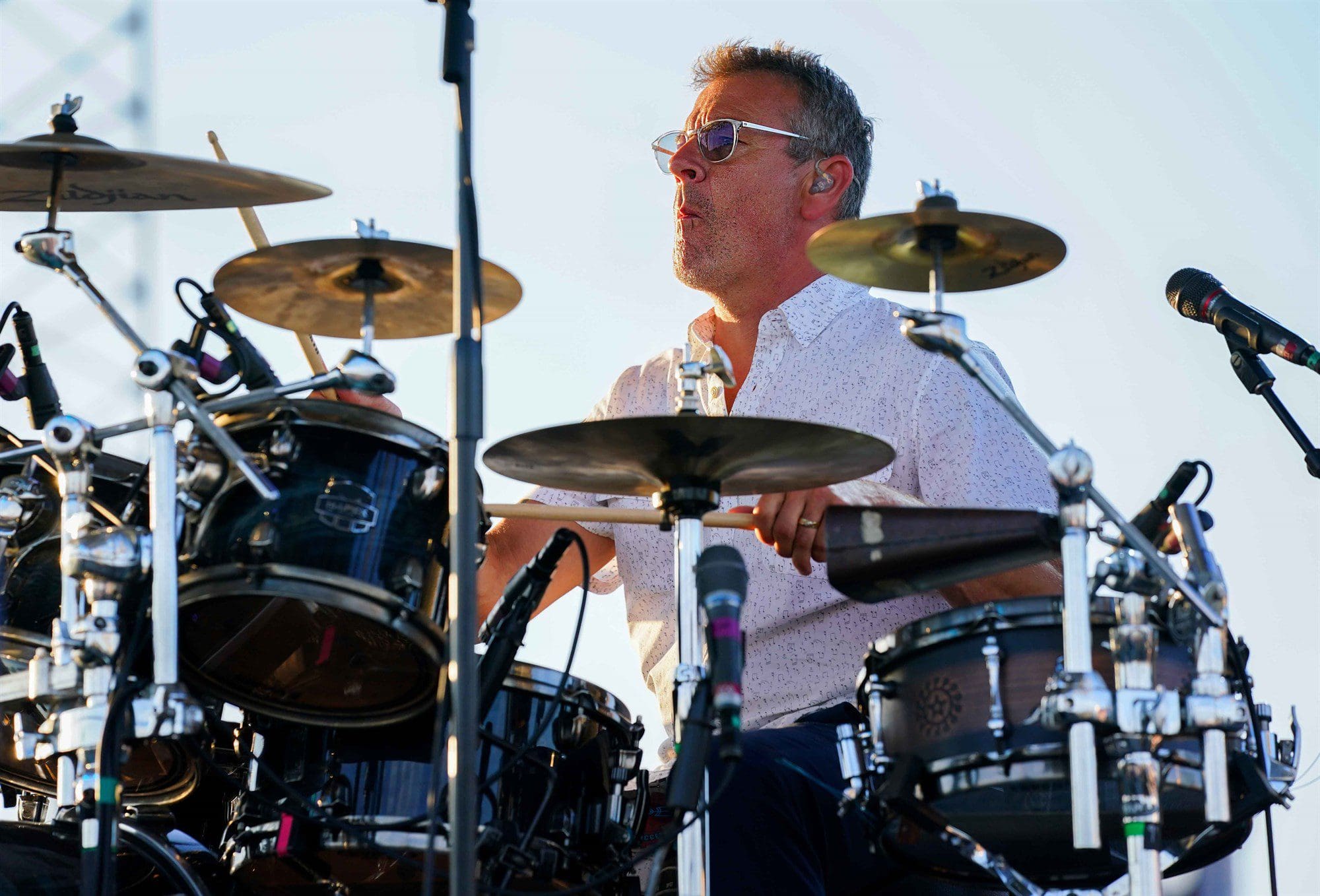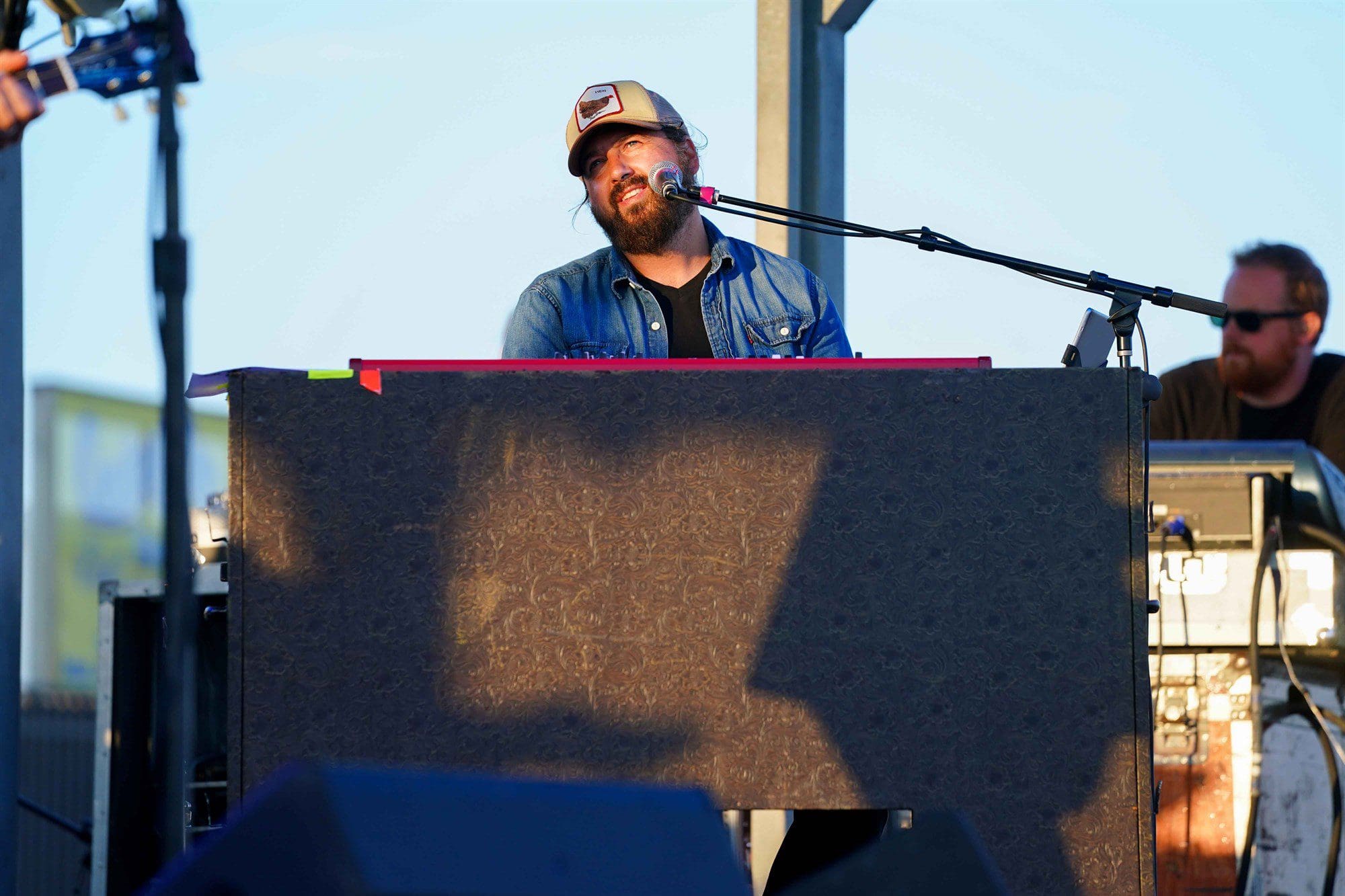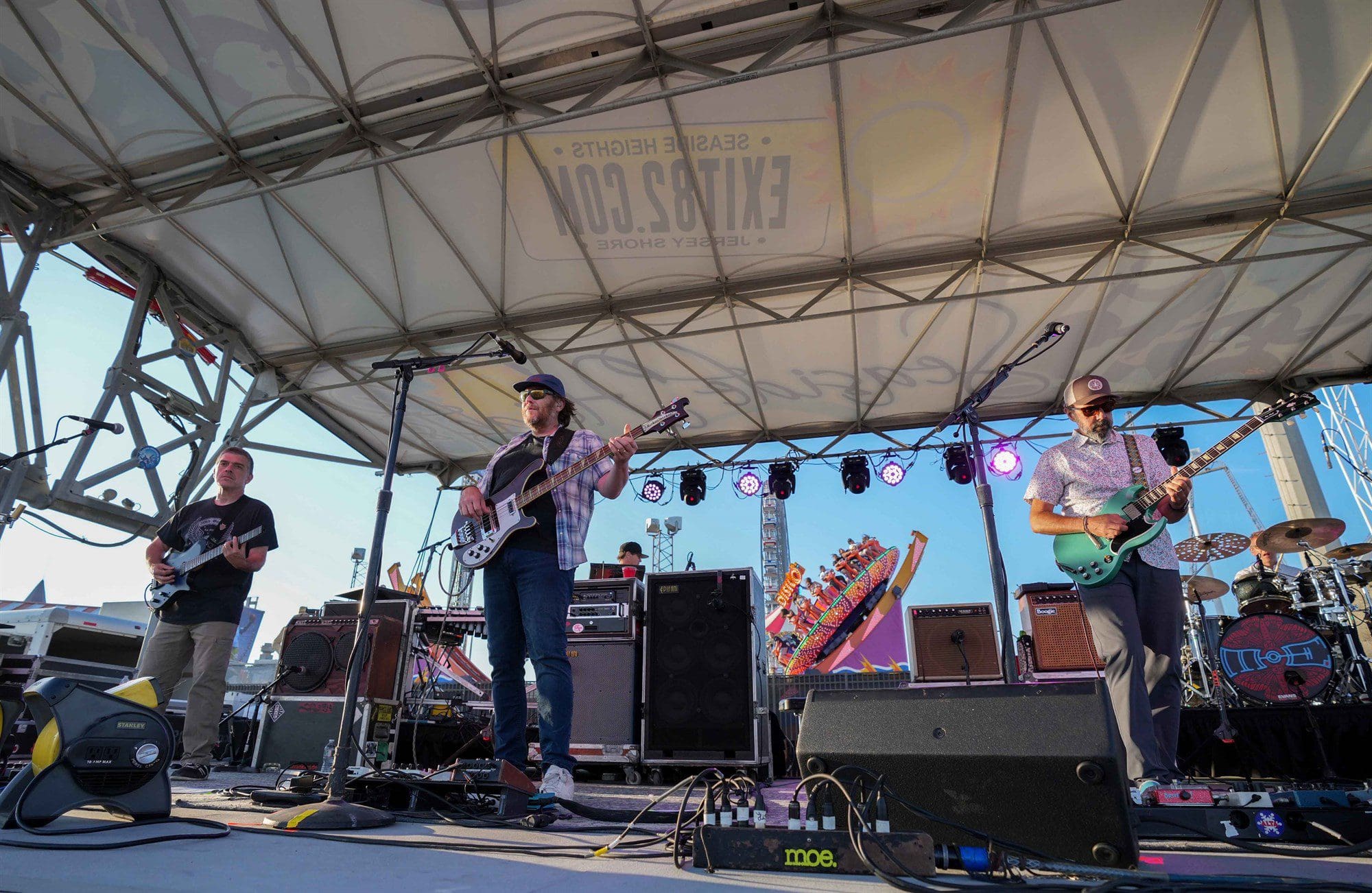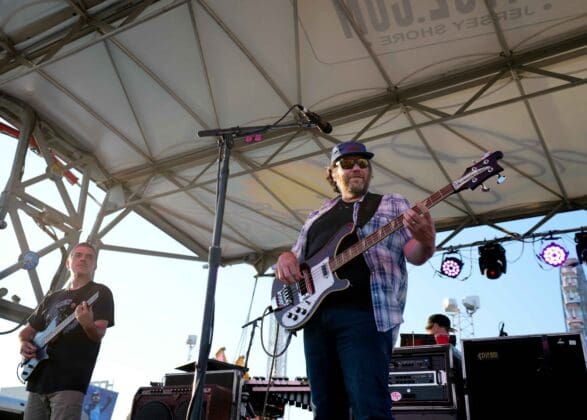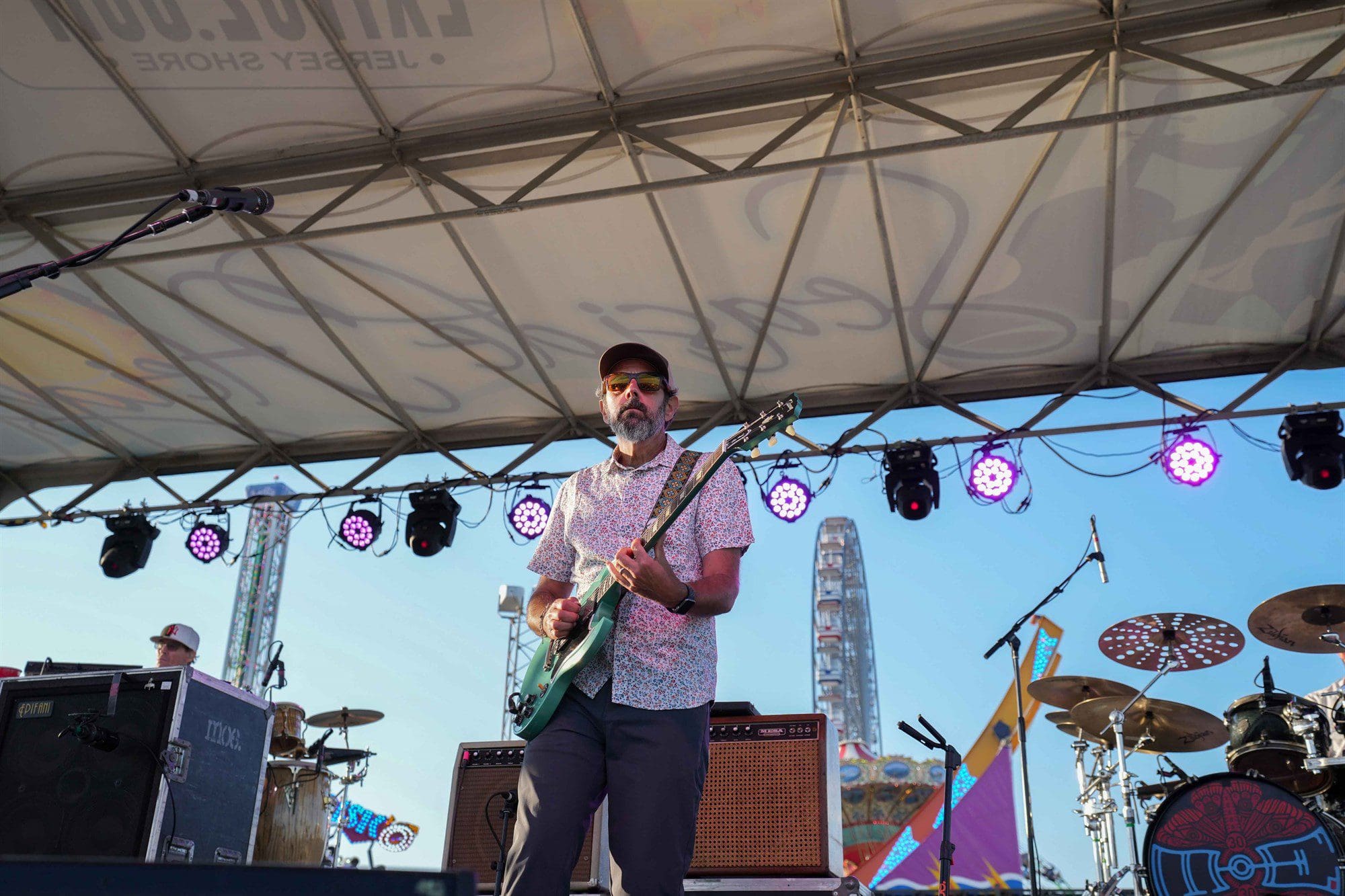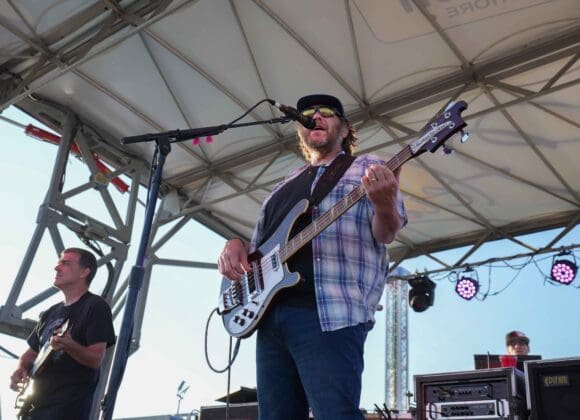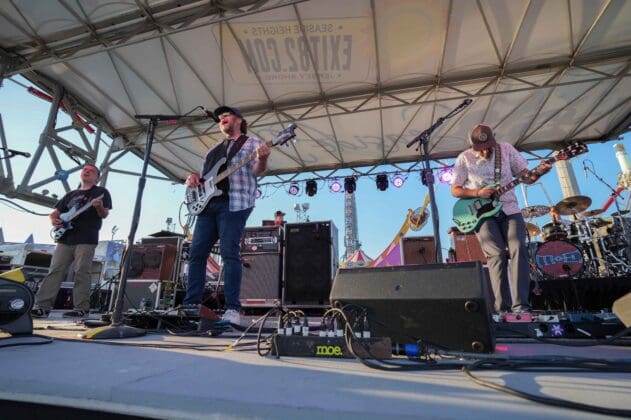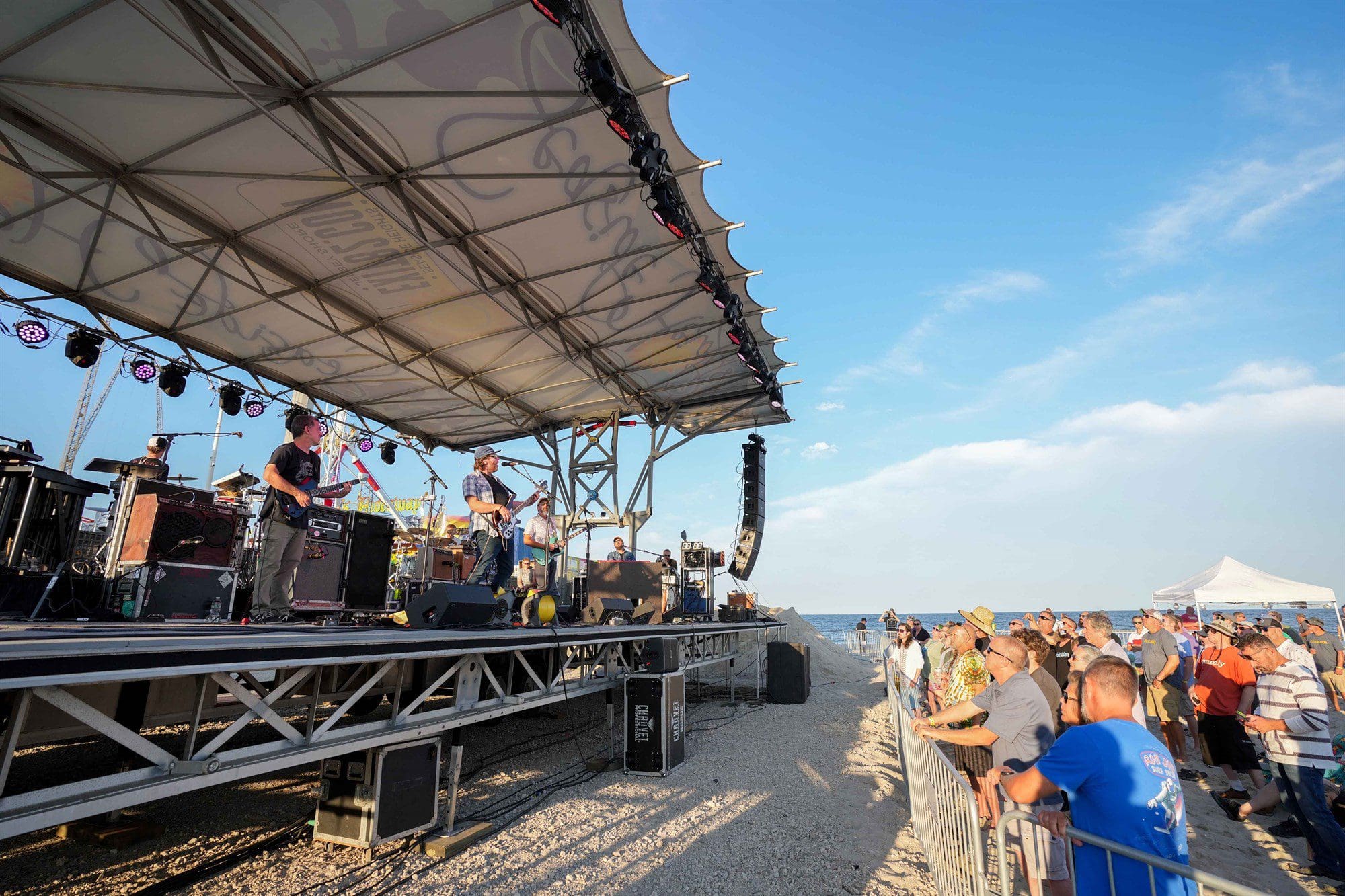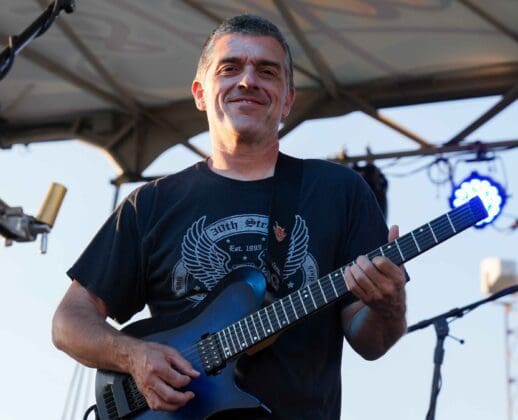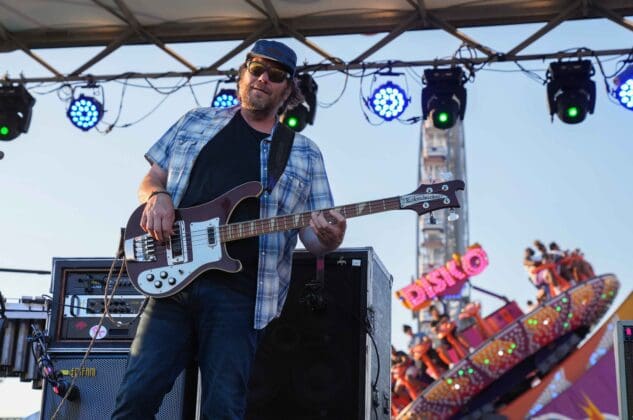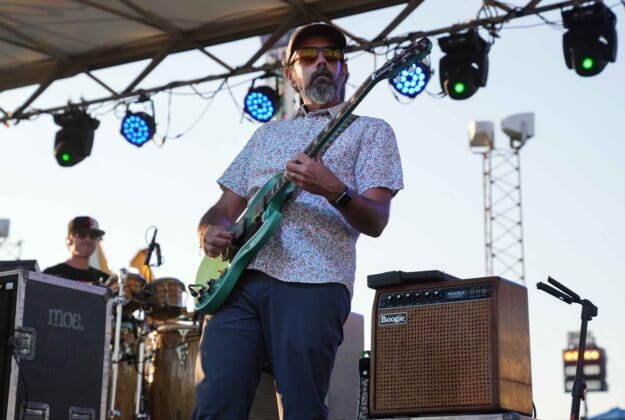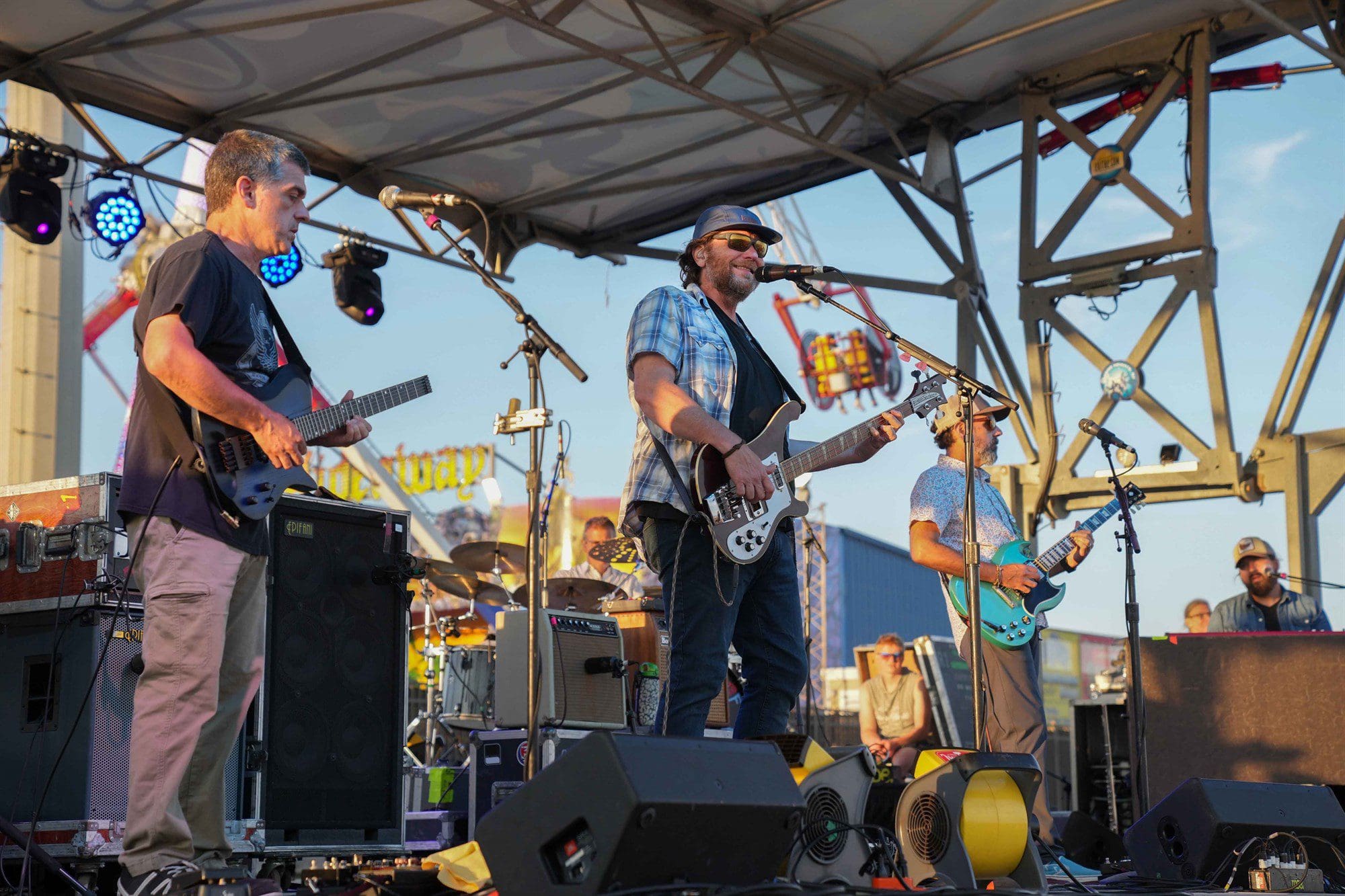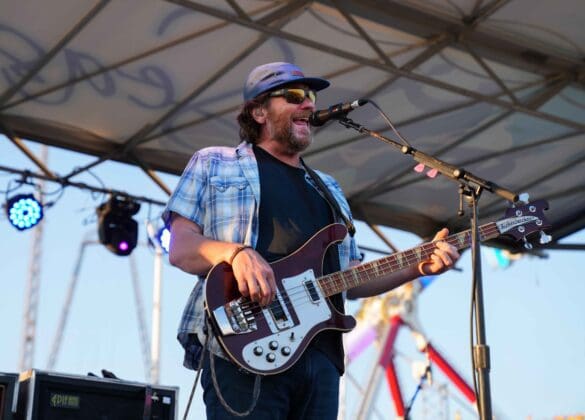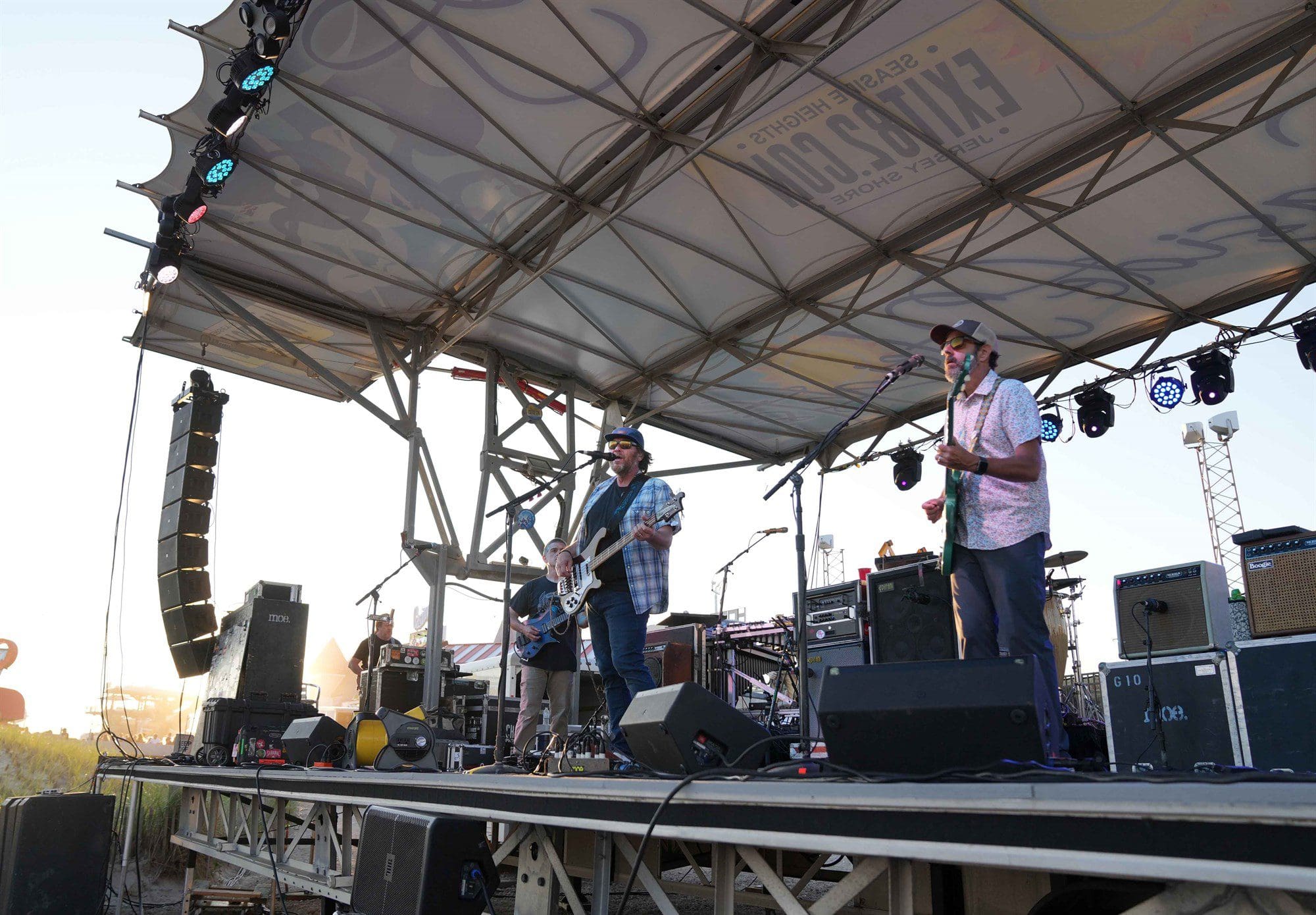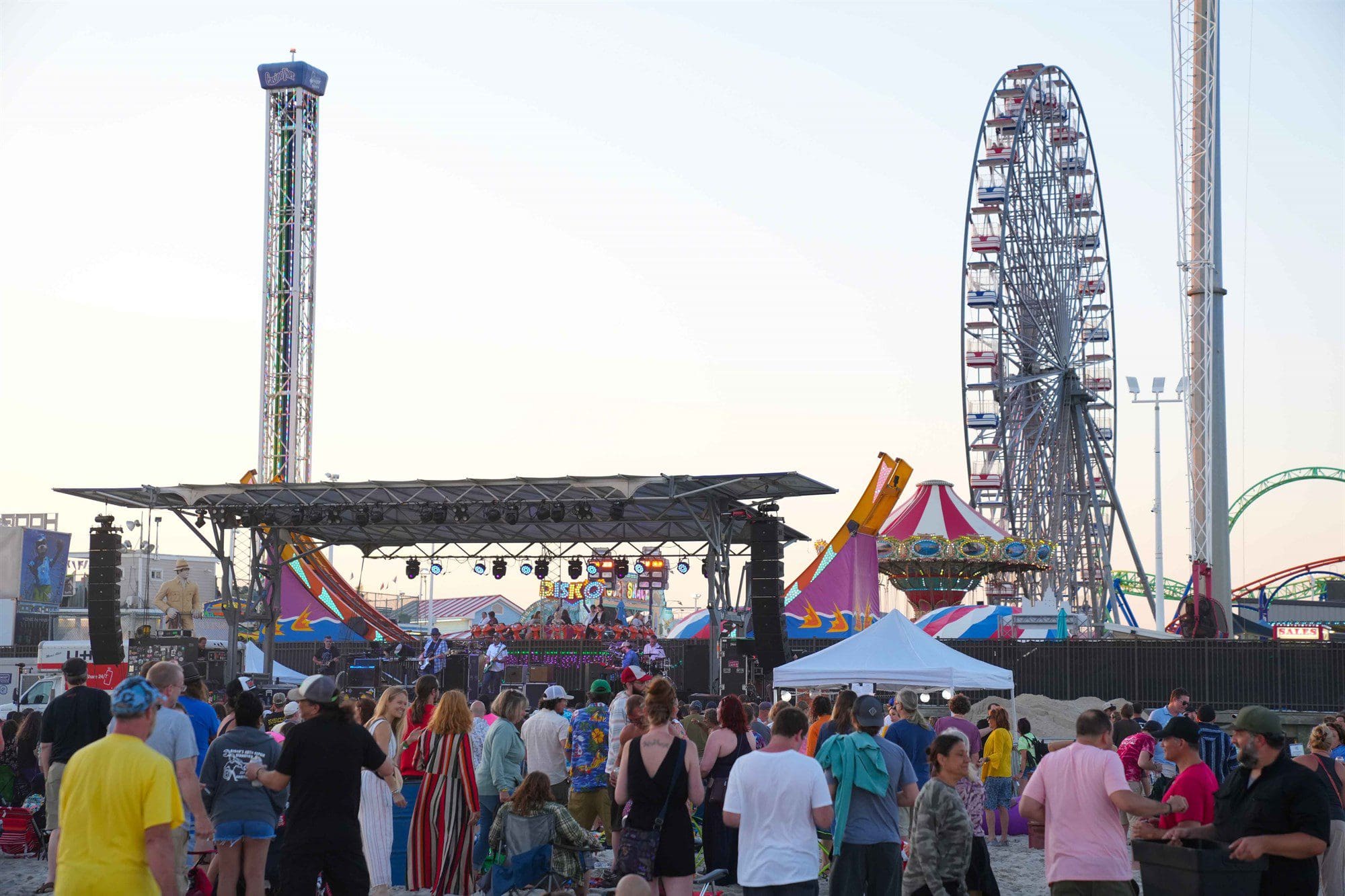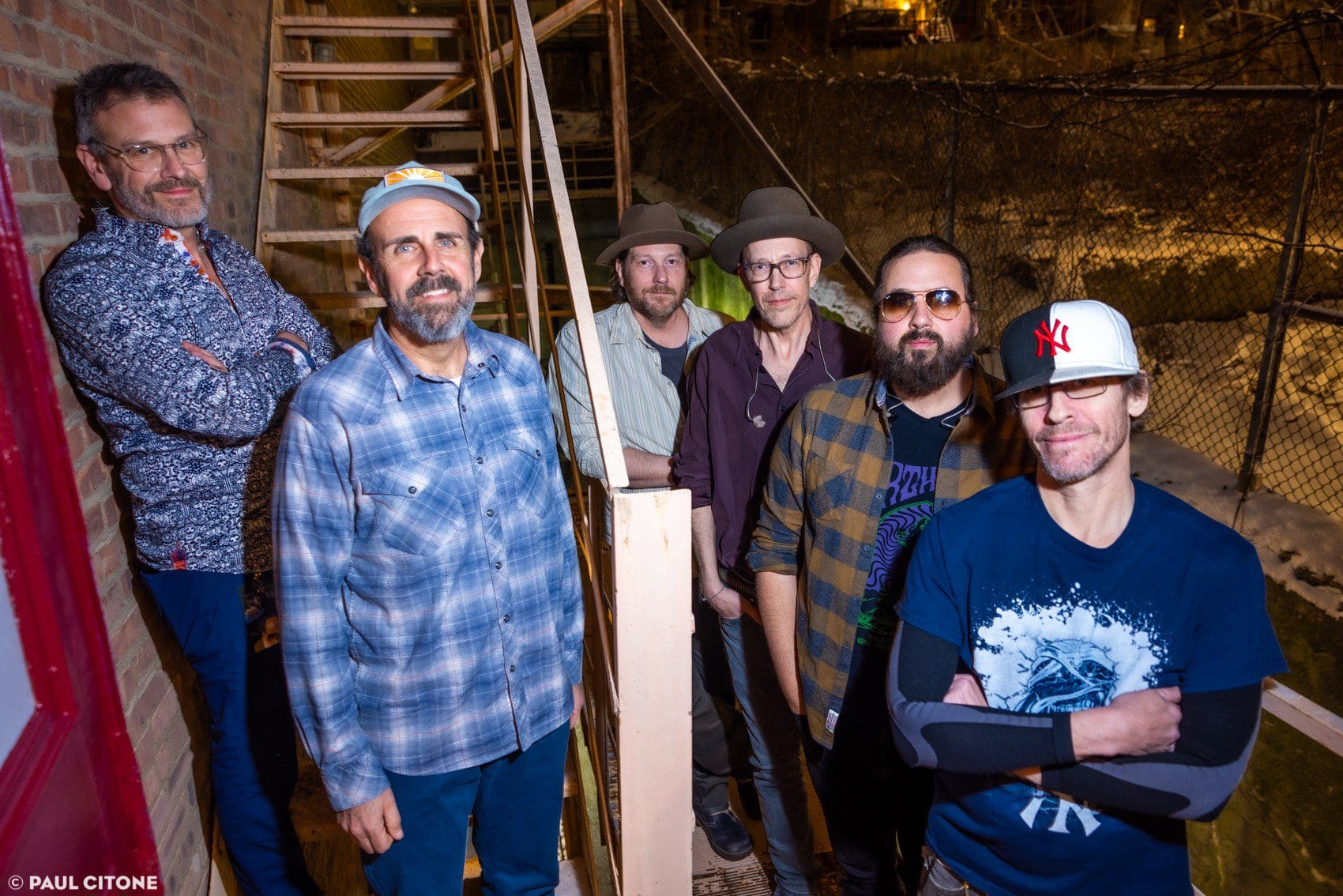
Written by James Barry
It’s been over three decades since a couple of friends at the University of Buffalo decided to start a band, and unknowingly started a lifelong musical odyssey. United by a rejection of the cubicle and a penchant for partying, Five Guys Named Moe was born. After a few years and about 15 different drummers, the group shaved its name down to moe. and found the one percussionist who stuck: Vinnie Amico.
Now moe. has played thousands of shows across the globe, released 12 studio albums, shared the stage with their idols, and become a cultural phenomenon. Their stalwart fanbase relishes the live moe. experience, mythologizing shows and moments on tour, cataloging setlists, following the band around the country, and authoring moe. lore.
The group is a jam band powerhouse. And they are as freewheeling as it gets. Every show is unique; nothing is rehearsed, nothing is routine, nothing ever gets stale. Thirty years of touring means thirty years of fresh music. If there is an ultimate moe. fan out there, someone who’s been to every single show since the early 90s, then even he has never heard the same song twice.
Every moe. set is a science experiment. You can see the group’s chemistry like it’s bubbling from the beakers. The microphone stands are Bunsen burners. The toms are crucibles. The players deftly handle their chemicals. They just don’t wear lab coats.
Ahead of two such experiments at the Borgata in Atlantic City this weekend, I had the chance to talk to Vinnie about his long, strange trip as the drummer of moe. We dove into the depths of improvisation, we reflected on his own musical inspirations, and we marveled at the two-way channel of energy that is live music. And with 30 years of sonic expedition behind him, he had a wealth of wisdom to impart.
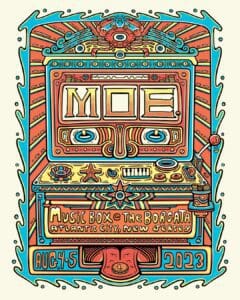
Does it feel like it’s been 30 years?
Yes and no. It goes by quickly, so you’re like, I can’t believe I’ve been doing this for 30 years. And then when you try to remember back 30 years ago, you realize it’s been quite a long time.
How does your relationship to a song change after decades of playing it?
It’s interesting, because the songs, a lot of them have changed over time. And you play them, and you improvise them and you change them, and then you get comfortable with a specific thing you’ve found that you enjoy. So, the playing changes, but also your perspective of the world has changed; so your perspective on the words has changed. I don’t write most of the songs, but the meaning of some of the words to those songs has changed. In particular, over the last couple of years with some of the health issues we’ve had and some of the things that have happened in the world politically and otherwise. So, it changes with your perspective of what is happening all around you, as well as age.
Have any of the songs felt prophetic as you look back on them?
Some of them. If nothing else, cyclical. Because there have been some songs written about certain people at certain times that have come back around with different people. So, there are definitely cycles in the way the world works.
So, you don’t write the songs, but you do write the sets.
Yes. I don’t write most of the songs. I’ve written a song or two. But I do get involved in writing setlists. Right now, it’s Al, Rob, and me who write them. So, I write every third set list.
And how much of writing the set list depends on how you’re feeling that day?
Quite a bit. There’s no real formula to it other than the fact that we don’t like to repeat songs. So you try to not repeat things you played the night before, or the last two or three shows or shows. And then, you also try not to (although I don’t get too involved in this) include songs that have been played in those particular markets at other times. I don’t really follow that rule, I don’t go back that far. But there are definitely times when I feel like playing this particular song, or I feel like jamming out or rocking that night. So you try to weigh what you’re feeling with what songs are available that particular evening, for sure.
And how do you think of what song will flow into the next one well, how they mesh together?
Well, I do it differently than the melodic instrument guys. I try to make the show flow via the groove. So, the improvising works through how the grooves fit together, which can be tougher on the melodic instrument guys if they have to make movements in keys. So, if the song is in A and then they have to move to something that’s not a relative key, then they’ve gotta make a couple of adjustments, or they’ve gotta modulate a step, or step and a half to get to the next part, which can be challenging. The other guys write their sets and their segue and improv via keys. So, they try to keep stuff in relative keys, so those switches are easier. But, a lot of times, the flow gets screwy because the grooves don’t match up. And that can be tough. So, I like to try to make the whole show flow groove-wise.
So, the writer of the set kind of has to carry the set when the others need to make adjustments?
Not necessarily carry. It’s like a painting, in that you can visualize the way the set will go. But you’re only 1/6th of the arm that’s going to make those brush strokes. So, because I do it toward the groove, I know the show can flow forward the whole evening. Whether the bass player and the guitarist can make those changes, that’s the tough part for them. And if they’re writing a set, and everything’s flowing great, and it’s really easy to make a key change, but the song has to slow down 20 beats per minute, or it has to go from 4/4 to 6/8, then I’m the one who has to work hard to make that adjustment. But it’s all fun. It makes for very interesting sets, because we don’t rehearse the stuff. And sometimes it takes you a while to get to where you want to go.
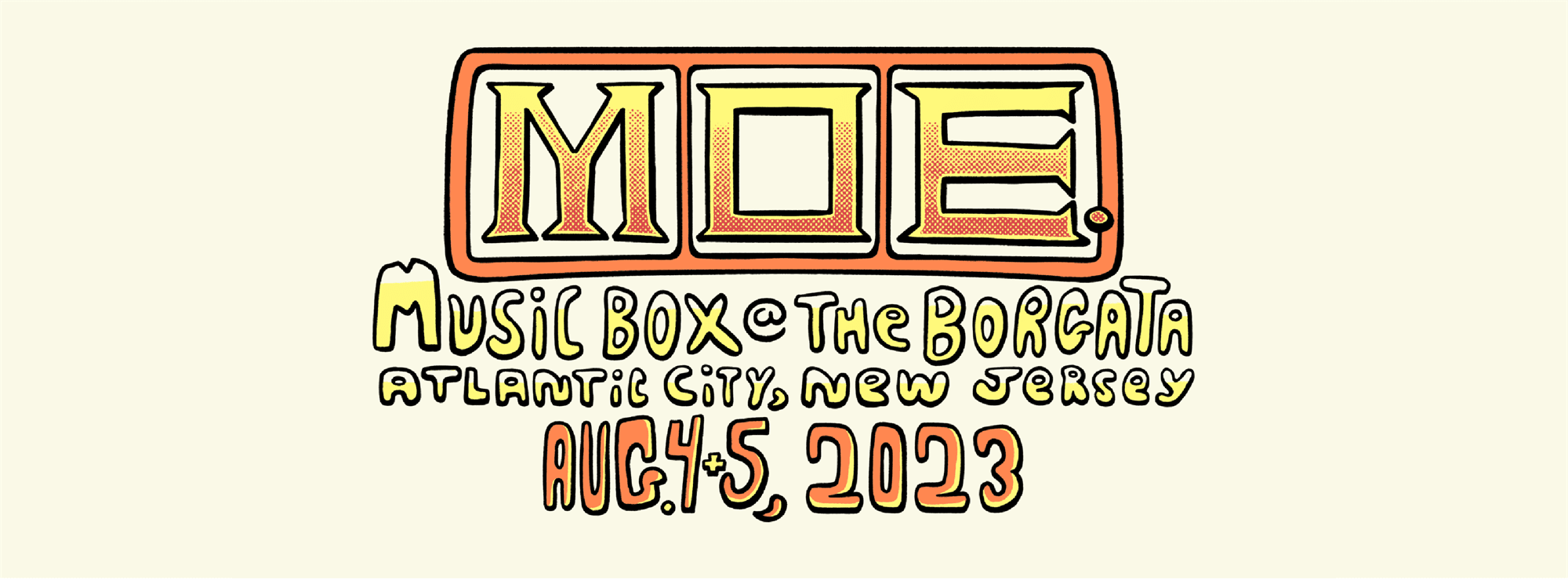
Are there any songs in particular you feel give the group more freedom to experiment and to jam?
There are a lot of them. So, it’s tough to say. There are a lot of them within segues. So, there are certain songs that have a certain openness to them at the end, so we know they are good vehicles to jam from one song to the next; make a segue. And then you can get into a long improvisation out of a particular song that will get you into another song. We call them jam vehicles. You have a good out and then a good into something else. But there are also long songs with opportunities within them. “Recreational Chemistry” is a great song, it can be 25-30 minutes long, and there can be a lot of improvisation in it. “Meat” is another one, and “Plane Crash.” We have a lot of big songs that can be open in the middle, and you can go pretty much anywhere in them. So, we have a lot of room to explore and do what we do.
Is “Mexico” one of those songs? Because I’ve heard versions of it that differ by fifteen minutes at least.
Oh yeah. “Mexico” is one of them too. It has a couple of open solo sections that you can take to different places.
And that’s an older one. Is that a 30 year old song?
Yeah. That got written in ’92, maybe. Maybe even before that. That song was written before I was ever in the band.
Have you guys talked amongst yourselves, try to process that it’s really been three decades?
It comes up from time to time. We reminisce. But we don’t just talk about Holy shit, it’s been 30 years. I mean, we kind of do…It comes up in interviews like Oh my God, we’ve been doing this for so long. But we still enjoy it. And that comes up in conversations, too. Like, Why are we still doing this? Oh yea, because we love to do it and we don’t know how to do anything else. We like being together on the road, partying and having fun, and playing this music for people.
After playing thousands of shows…I don’t feel like I could remember each of them. So, what are some of those things that make a particular show stick with you?
Well, my memory is bad so I’m kind of with you on that. But a lot of the time it’s certain venues you remember. That will spark memories of the show itself…On this last particular tour we had a couple of really great shows. And two years from now I won’t remember. And then I’ll go back and I’ll remember that venue, and I’ll think Oh yea, that show was killer. So, a lot of times, it’s the venue or the city that will make you remember that show from that year and what we played.
Plus, I was a concert goer before I did this. And I still remember being at Grateful Dead shows, and being like Oh my God, that was an amazing show. They did this, they played that.
And a killer show, is that more so how well you feel like you guys played, or the reaction you get from the crowd?
It’s interesting. It can be both…I usually feel like if I had an amazing show, if I played great, then the show was great. But that doesn’t always come across to everyone. And a lot of times it’s how the crowd reacted. And how the crowd thought the show was. I could have a crappy night, and I don’t really go online and read, but you’ll get some reports back and people will say, that was one of the best shows I’ve ever seen. So you don’t get a lot of fan feedback. And a lot of times that’s what ends up making the show, more so than how well we played. Or maybe the vibe in the room. Maybe the room was just rocking, even though I didn’t have my best night.
I suppose it really is the fans who mythologize the shows.
Oh yea. They do mythologize. A lot of times, they actually come up with their own scenarios for how we got to jamming from this to that, or why we did certain things, when we don’t even know we did it. You’ll read about something like, Oh my God, they did this, and it meant this to me, or I think this is what it meant. When in reality, we just made a mistake and nobody knew about it, and it turned out to be a great mistake. Or it’s actually just some weird thing we didn’t even know existed. And it’s now in the moe. lore as this one thing that happened. Which I love. I mean it’s amazing that our fans are so invested in what we do. It’s awesome.
And in that way, it’s like the imperfections are what make a show more memorable to the fans.
People love when we screw up. They love it when we take chances. And sometimes they work, and sometimes they don’t. But I think the humanness of it, the mistakes, is a big part of why people enjoy it. We’re human, we make mistakes. We’re not robots. We’re not playing the same stuff every night the same way.
And when you were a concert goer, did you admire that in bands like the Dead? And did that inspire you to take risks when you played?
Oh, absolutely. The Dead, for sure. Allman Brothers…I saw a lot of shows. Whether it was Yes or Genesis, many of those shows I saw back in the day where bands took chances…Santana. Crosby, Stills & Nash. The live performances, particularly back then, you noticed it more than you do now. There was no backing track. There was no playing to a click track live. So you heard the band live. You heard the mistakes. And you heard the peaks, the mistakes, the chances they took. You heard all that stuff. And it definitely had an influence on me wanting to do this, and the way I play now.
Do you think, playing so naked back then, that artists held themselves to a higher standard live? Has that faded as artists can rely on technological corrections?
I would say yes. I mean, we’re naked, we still play that way. We don’t have tracks. We don’t play to clicks or any of that. But I think, yea, you had to be on. And you’re gonna always be on. Nobody ever is. But the more you do it, the better the chance you have of being on.
And if you had to surmise, what leads to a show where everyone is on? Can you feel it beforehand? Can you feel like it’s going to be a bad show, and then it’s a great one?
All of the above. Sometimes you feel the vibe of the crowd and you think it’s going to be awesome, and you screw up on the first song and get inside your head, and then you have a bad night. And sometimes it’s like the crowd’s light, nobody’s making any noise, and then it ends up being an amazing show. Then there are some nights where we’re all just kicking around and having fun beforehand, and then we just take that energy right on stage and have a great show. So it’s definitely all of those things.
Editor’s Note: Photos of moe. by Matthew Heasley from the band’s performance in Seaside Heights, NJ in 2022.
The way you guys play, your improvisational style, there are so few forms of live performance in art where people are improvising. It’s almost always something rehearsed. The only analogue seems to be stand-up comedy.
The two true improv arts are jazz, you know bebop, and stand-up comedy. You see comedians just start riffing, and the really good ones, they’re just brilliant. It’s amazing to watch when they go off on a tangent. And they can just crack everybody up, including themselves sometimes. It’s awesome.
And it has to feel even worse to bomb in comedy.
It’s funny, a comedian can start improvising something, and it just doesn’t come off. And musically, it can be the same thing. You’re playing and you’re trying to make something happen, and it’s just falling flat. You just fall on your face. And then we get done with the song and the crowd’s just sitting there with a blank stare going, What the Hell did these guys just do? (laughs)
So, when you’re improvising together, and you guys are really enjoying how it sounds, do you think the crowd feels that?
There’s no doubt. I have a way I describe it. And it happens quite a bit now. I call it “the music plays the band.” We get out on stage, and we’ve got a set list, we know there’s a lot of improvisation within the set list. And you start playing the show, and by the time the set’s over, you don’t even know anything. It went quickly, and the music was great, and there was a lot of improvising, and it just was playing itself. And I’m not talking about autopilot, it’s just you were so in it. It almost is like the music takes you over. So you’re not even playing the music, it’s playing you. And that’s the way I describe it a lot of the time: I got played by the music; or the music played the band. And that’s a quote from a Dead song. But it’s a very true thing, when you’re having one of those nights.
So, speaking of growing up admiring the Dead, I read you were in a Dead cover band called Sonic Garden. What can you tell me about that?
Well, it’s interesting, I started in that band, I think we put it together in the spring of 1988. So the Dead was at its peak. And we were playing Dead tribute style. So, the shows were set up just like the Dead. We were improvising a lot, we were taking psychedelics and playing just like they were. And we all became really good musicians doing it, and the band was killer. It’s really how I cut my teeth. But we all did it for fun. It wasn’t a money thing. It was a college band. We played on weekends. And we made good money, but none of us had ever considered that it was a viable career. And now, fast forward 35 years, and every band on the planet is playing that kind of music. And some of them are playing it professionally, for a living, which blows my mind. It’s awesome because the songs are great, and it’s amazing that people are still so into it. It’s shocking to me.
But, back to your question, that’s definitely how I learned how to play live, and how I learned how to improvise in a lot of ways; how I learned to use my ear and communicate with other musicians on stage through my instrument.
What was it like the first time you played live on psychedelics?
It was awesome (laughs). That’s one of those things where you remove your brain from the equation, and you open up so that your body starts to just play. You’re not thinking about it so much. And, on a good night, when you get into the right groove, you can play well and do anything. You’re not even thinking about it, so things are just working. And there are other nights where you might think that’s the case but everyone else is like what the Hell were you doing? because you’re out in your own world. But that didn’t happen too much with me.
Does it facilitate the experimentation while you’re playing?
Oh yea, for sure. And the thing is, if you’re really trying to stretch out and improvise, and leave the song, that is a very helpful tool. You’re getting rid of all the expectations. And if everybody is in a free spirit, and you’re a little bit advantaged with a psychedelic, and you’re all in tune with that, then someone starts to go off on a tangent and you all go with him. You can take yourself on some pretty cool journeys musically.
So what is it about being more willing to leave the song? Are you escaping some type of fear or rigidity?
It’s more of an exploration. If you want to truly improvise…We have a ton of originals. Some bands write more than we do, some less. We’re still writing, but not as much as we did. So the originality of moe. and the originality of those songs is the fact that we can leave them. We’re improvising and making the stuff up as we go…So for some of those nights where we’re playing songs we’ve been playing for 20 years, as soon as we get to an improvised section or a segue that’s going to take us from one song to the next, that’s all new original music happening. So, even though we didn’t write a new song, there’s a whole 15 minute section of brand new music we made up on the spot. And that’s leaving the song. That’s exploring and finding something new and going somewhere with it.
So, since you find that creative outlet on stage playing the music, does the band need some kind of routine or discipline to actually write new songs?
Yes and no. A lot of times, what can happen in the process is something sticks in one of those improv sections. You’re like, Remember that jam we did that night that was really cool? Let’s explore that as a new song. And that happens. And you write something new. And you hear it in moe. songs, especially if you’ve been a fan for a long time. You’ll hear a section of a song that sounds a lot like another song…We just take a part from a jam and turn it into another song without scrapping the original. And that happens quite a bit with us. And now, a lot of times, in the writing process, people come with full, realized songs. And other times, we still work on something that came from a jam. So we don’t really stick to one discipline of songwriting.
There’s a saying in poetry that all poems are made of other poems. Do you think that’s true of songs?
Oh, absolutely. You think about this: long before us, there was the first popular music. They had big bands in the 20s and 30s, and then that turned into bebop and blues, and then that turned into rockabilly and rock and roll. The music keeps morphing, but it’s not like anybody’s doing something that hasn’t been done. It all comes from previous influences. So that’s been going on since the beginning of time with music. And it continues.
So, do you think the best musicians are usually the best listeners?
I would say yes. Because if you’re a musician and you’ve played with people who don’t listen, you know it’s much harder. It’s just like talking to somebody. It’s communication. You listen to somebody; you have a conversation with that person. And with people who overtalk or don’t listen, it’s really hard to have that kind of conversation. So the ones who listen best are usually the best communicators. And it’s the same with music, the best listeners usually become the best players.
It seems to me, the more music you absorb, the more music you’re able to play.
Absolutely. I describe it to some of my students this way: the more stuff you have in your bag, the more you have to offer. So, for me, I learn a bunch of stuff and it just stays in my little bag of tricks. And the more of those tricks you have in your bag, the more you can put into songs.
So are you still listening to new music all the time? Trying to find new artists?
It’s funny you ask that; I was just talking to someone about this the other day. I don’t listen to a lot of new music at all. I listen to what I like. There’s still so much out there that I haven’t heard that I’m still trying to get through. And plus there’s not a lot of stuff that really grabs my ear these days. That’s not to say it’s not out there. I just don’t listen to a lot of it.
Are there any bands that jam, who have maybe played under moe. at shows, who you’ve seen rise over the years?
Yea. It still happens all the time. You see these great players in some of these bands, and if they start to write songs that stick, it’s really interesting. There’s Dogs In A Pile, Pigeons Playing Ping Pong, bands like that where are the players are great players, and they’re starting to write some really good songs. Aqueous was another one. The players are so good. And they’re young, they’re kids.
So do you think of your younger self when you see those bands, and think of things you’d tell him now if you could?
All the time. Every time I see one of the younger bands, I give them some piece of advice. Usually I just tell them how well they’re playing. I like hanging out with some of the younger guys, because I’m old.
Were there artists who did the same thing for you guys when moe. was coming up?
Yea, definitely. We were fortunate enough to get to play with all the guys in the Dead when we were in our late 20s. And that was huge, because we spent weeks with them on the road, and The Black Crowes and Bruce Hornsby, different guys. And then we went out with Phil Lesh & Friends in the late ’90s. And we went out with Robert Plant when we were in our 30s. And these guys were all seasoned rock and roll stars. So to do that and to be able to spend good chunks of time with them and see how they operate, and even hang out with them and talk to them about their careers and their stories, that was definitely a good learning experience for us.
And how much did that mean to you guys, for those artists to take you under their wing like that, to deem you worthy? Did it give moe. a confidence boost?
To go from idol to peer is amazing to me. When I was young and going to see these bands in concert, and they’re up on the big stage, and you’re like, this show is amazing and I’m having a great time…Having that stick in your memory and then fast forwarding 6 or 8 years and you’re sharing the stage with those people and hanging out with them night after night, and they’re becoming your peers…Not only is it an awe-inspiring moment, but it’s also validating. You feel like you belong. Here I am getting respect from the dudes I idolized when I was younger.

